The Intel Skylake-X Review: Core i9 7900X, i7 7820X and i7 7800X Tested
by Ian Cutress on June 19, 2017 9:01 AM ESTBenchmarking Performance: CPU Office Tests
The office programs we use for benchmarking aren't specific programs per-se, but industry standard tests that hold weight with professionals. The goal of these tests is to use an array of software and techniques that a typical office user might encounter, such as video conferencing, document editing, architectural modelling, and so on and so forth.
Chromium Compile (v56)
Our new compilation test uses Windows 10 Pro, VS Community 2015.3 with the Win10 SDK to combile a nightly build of Chromium. We've fixed the test for a build in late March 2017, and we run a fresh full compile in our test. Compilation is the typical example given of a variable threaded workload - some of the compile and linking is linear, whereas other parts are multithreaded.
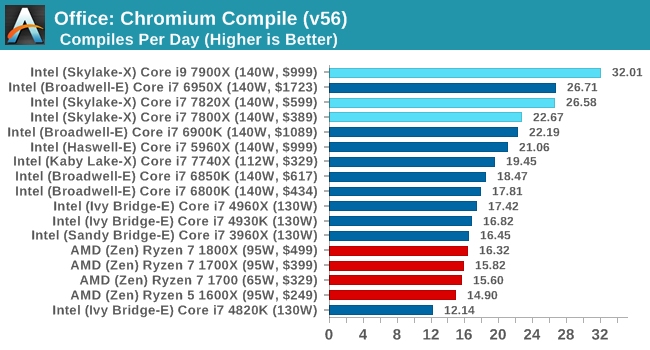
PCMark8
Despite originally coming out in 2008/2009, Futuremark has maintained PCMark8 to remain relevant in 2017. On the scale of complicated tasks, PCMark focuses more on the low-to-mid range of professional workloads, making it a good indicator for what people consider 'office' work. We run the benchmark from the commandline in 'conventional' mode, meaning C++ over OpenCL, to remove the graphics card from the equation and focus purely on the CPU. PCMark8 offers Home, Work and Creative workloads, with some software tests shared and others unique to each benchmark set.
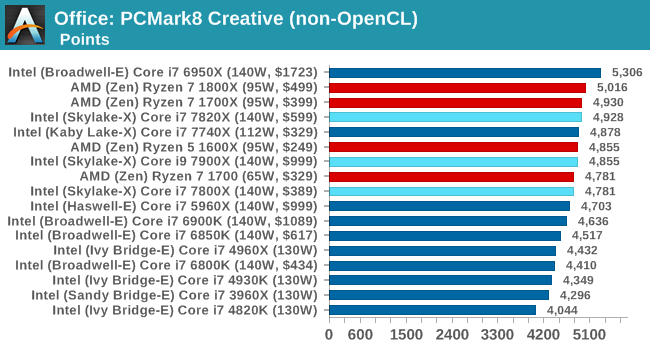
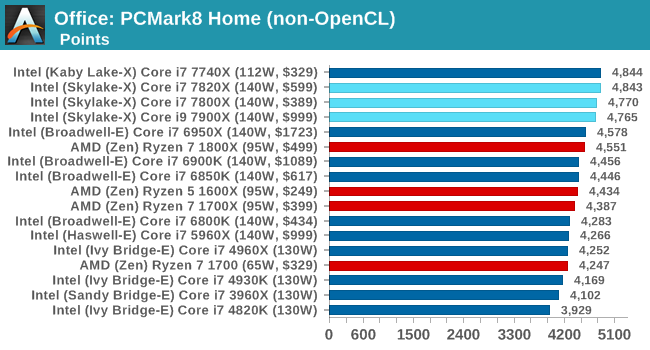
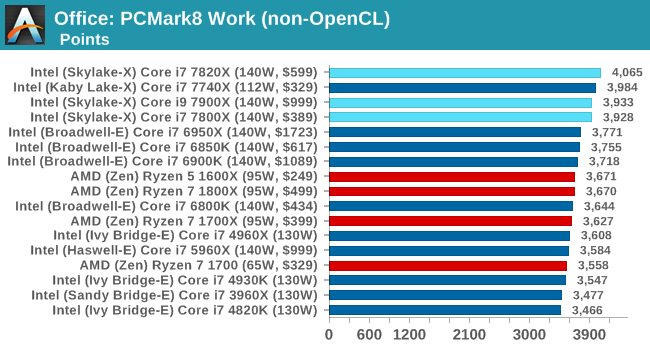
SYSmark 2014 SE
SYSmark is developed by Bapco, a consortium of industry CPU companies. The goal of SYSmark is to take stripped down versions of popular software, such as Photoshop and Onenote, and measure how long it takes to process certain tasks within that software. The end result is a score for each of the three segments (Office, Media, Data) as well as an overall score. Here a reference system (Core i3-6100, 4GB DDR3, 256GB SSD, Integrated HD 530 graphics) is used to provide a baseline score of 1000 in each test.
A note on context for these numbers. AMD left Bapco in the last two years, due to differences of opinion on how the benchmarking suites were chosen and AMD believed the tests are angled towards Intel processors and had optimizations to show bigger differences than what AMD felt was present. The following benchmarks are provided as data, but the conflict of opinion between the two companies on the validity of the benchmark is provided as context for the following numbers.
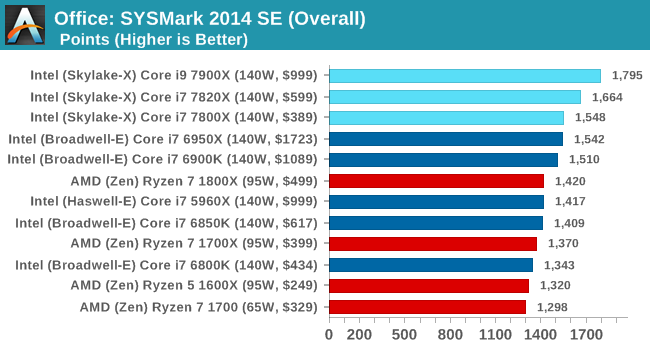










264 Comments
View All Comments
Gothmoth - Monday, June 19, 2017 - link
shoody performance.. what are you talking about? stupid games?bios updates will fix that.
could not care less about games. but the intels are faster.. no way around it.
more pricey but faster.
Flying Aardvark - Monday, June 19, 2017 - link
You nailed it. Between the temps and power draw, to jump on this lineup is really silly. I like the 1700 for a small air cooled mITX setup. If I moved to anything else I'd dump all this stuff in the middle and go straight to Threadripper.If you're going for thread count, do it right and get 16C/32T. Or just stick to a nice cool and quiet R5 or R7.
cocochanel - Monday, June 19, 2017 - link
How do they get stomped ? AMD power consumption is about half of that of Intel's.Can you please explain ?
Yongsta - Monday, June 19, 2017 - link
Wow, comparing $1000+ high end enthusiast desktop parts vs $500 and lower consumer desktop parts. Wait for Threadripper and Ryzen7 right now offers a lot more bang for the buck (if you get the 1700 and overclock it).tarqsharq - Monday, June 19, 2017 - link
Those multi-threaded benchmarks are going to get really ugly for Intel in a few months I think, especially from a bang for buck perspective.T1beriu - Monday, June 19, 2017 - link
Wrong name: derba8urReal name: der8auer
Page 6.
Ryan Smith - Monday, June 19, 2017 - link
Thanks!jjj - Monday, June 19, 2017 - link
A lot of talk about the mesh but not testing it, at least the basic memory BW, latency and scaling.No power numbers at all? No OC and temps....
Why focus on perf and ignore all else when perf is more or less a known quantity and the unanswered questions are elsewhere.
For Intel you list all Turbo flavors, for AMD you forget XFR when comparing SKUs.
Luckz - Monday, June 19, 2017 - link
http://www.tomshardware.com/reviews/intel-core-i9-... has you covered re the meshjjj - Monday, June 19, 2017 - link
PCPer tries to look at it too.